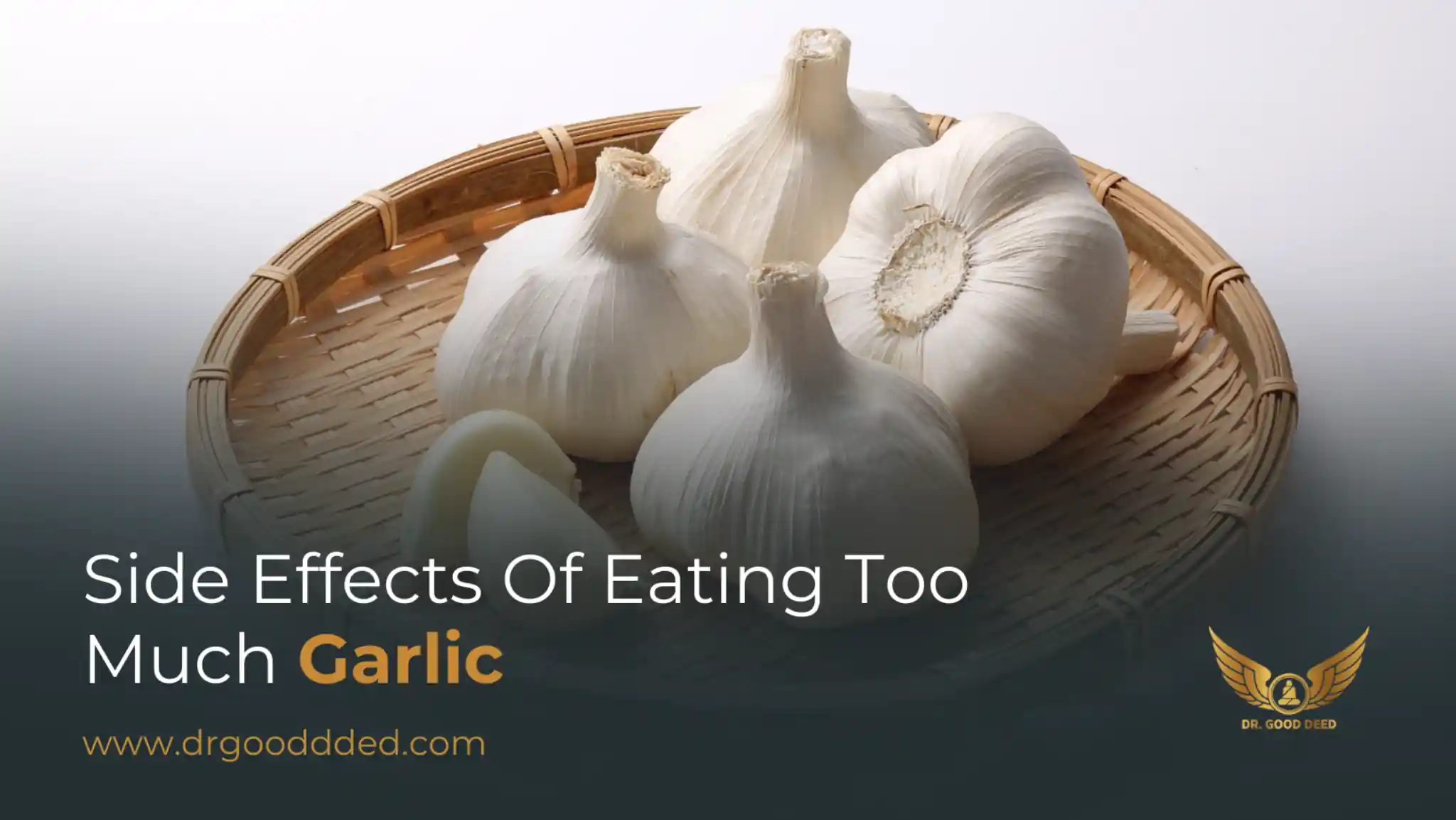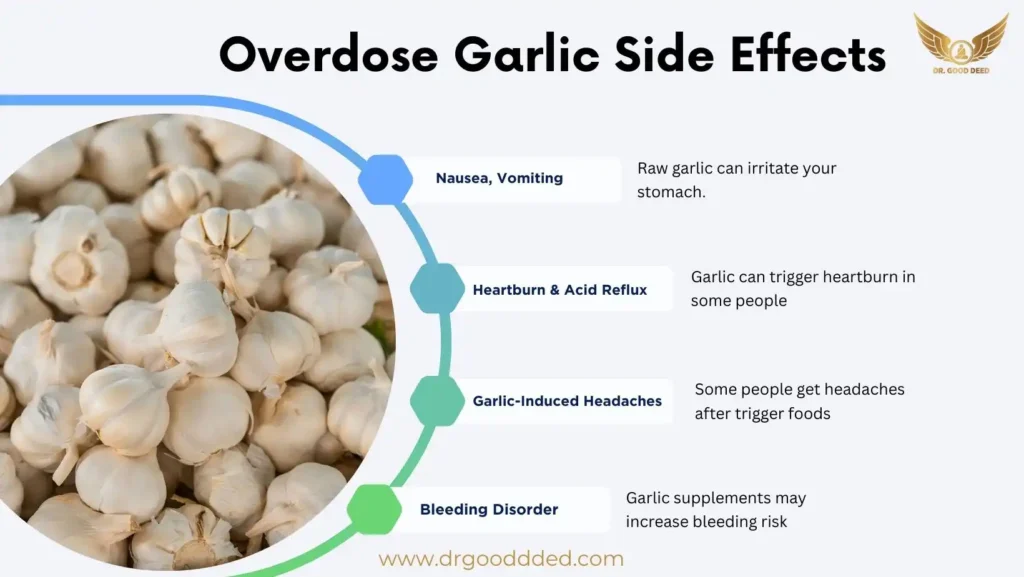Side effects of eating too much garlic can show up in your stomach, your breath, and even your sweat. You might feel burning in your chest, nausea, gas, or a headache. If you take garlic pills, the risk can rise because the dose can be much stronger than food garlic. The safety point that matters is that garlic supplements can raise bleeding risk, especially when you already take blood-thinning medicines.
You do not need to fear garlic. You just need to know your limit. Your body gives clues fast. When you learn those clues, you can keep the benefits and avoid the worst side effects of eating too much garlic .
What Happens When You Eat Too Much Garlic
Garlic has sulfur compounds that smell strong. Your gut breaks them down. Some parts get absorbed into your blood. Then your lungs and sweat help push them out. That is why garlic can affect breath and body odor for hours.
When you eat a lot, your stomach lining can get irritated. You might also get more gas. If you have IBS , garlic can hit harder because garlic contains fructans (a type of fermenting carb). These can trigger bloating, cramps, and diarrhea in sensitive people.
That is how side effects of eating too much garlic often start: gut irritation first, then smell, then other body symptoms.
How Much Garlic Is Considered “Too Much”?
There is no single number that fits everyone. Your stomach, your gut condition, and your medicines matter. About one to two raw cloves per day is often considered safe for adults, but too much raw garlic can upset your gut, especially on an empty stomach.
So “too much” usually means this: you eat garlic, and your body reacts. If you get symptoms of too much garlic after small amounts, your personal limit is lower than average.
Also, garlic in typical meals and garlic supplements are not equal. Supplements can concentrate compounds. That can increase side effects, including bleeding risk.
That is why side effects of eating too much garlic may show up faster with pills than with cooking garlic into a meal.
Short-Term Vs Long-Term Health Impact
Short-term effects can show up within minutes to hours. You might feel nausea, burning, burping, or cramps. You might also notice strong breath and sweat odor.
Long-term heavy intake can keep your stomach irritated. If you already have reflux, the irritation can repeat. If you take garlic supplements often, you also need to think about bleeding risk and drug interactions. Garlic supplements may increase bleeding risk, and you should tell your health care provider if you use them, especially before surgery or if you use anticoagulants or aspirin.
That is one of the most serious side effects of eating too much garlic because you might not notice it until you bruise or bleed more easily.
Garlic Overdose Side Effects You Should Know
People say “overdose” to mean “way too much for your body.” With garlic, that often happens when you eat a lot of raw cloves, or when you take strong garlic pills.
The most common side effects of garlic overdose involve your stomach and your smell. But your head and skin can react too.
If you push through symptoms, the side effects of eating too much garlic can feel worse the next time. Your gut can get more sensitive after repeated irritation.
Nausea, Vomiting, And Gastrointestinal Distress
Raw garlic can irritate your stomach. That can cause nausea. Some people vomit. Some people get loose stools or diarrhea. Large amounts of raw garlic can cause stomach upset and gas, and it can even change gut bacteria patterns.
Here is when you should not brush it off. If you cannot keep fluids down, you can get dehydrated. If you see blood in vomit or stool, you need urgent medical care.
This is a core part of the side effects of eating too much garlic story because your gut usually takes the first hit.
Garlic-Induced Headaches
Some people get headaches after trigger foods. Garlic can be one of them. The cause can differ. You might react to the strong compounds. You might feel pain because you got dehydrated from vomiting or diarrhea. You might also feel worse because heartburn kept you up.
If a headache comes with fainting, severe weakness, or confusion, you should treat it as a medical problem. Headaches do not happen to everyone, but they still are on the list of side effects of eating too much garlic .
Excessive Sweating And Body Odor
Garlic smell can come from inside your body. That is why it can show up in sweat. It can also show up in breath even after brushing. Breath and body odor are common garlic side effects, and they happen more often with raw garlic.
So if you notice a strong odor and sweating after heavy intake, it can be a side effect of eating too much garlic . It does not mean you are “dirty.” It means your body is clearing the compounds.
Quick note: strong odor plus skin itching or swelling can also point to garlic allergies and reactions . If breathing feels tight, that becomes urgent.
Garlic Breath And Digestion Issues Explained
Many people think garlic only causes bad breath. The real picture is bigger.
Garlic breath and digestive issues often happen together. Your stomach irritation can increase burping. Burping carries odor up. And the compounds can also leave through your lungs and sweat.
That is why the side effects of eating too much garlic can feel like they follow you around all day.
Why Garlic Causes Strong Breath And Odor
Some garlic compounds enter your blood. Then your body releases them through your breath and sweat. That is why mouthwash alone may not fix it.
This is also why the smell can last for hours. You can brush well and still notice it.
Breath odor is annoying, but it also works like a warning sign. It can tell you you ate more than your body handles well. That is a very common form of side effect of eating too much garlic .
Heartburn & Acid Reflux After Eating Garlic
Garlic can trigger heartburn in some people. If you already have GERD, symptoms can get worse.
Heartburn feels like a burning in your chest or throat. Acid reflux can also cause a sour taste, coughing at night, or a scratchy throat.
If reflux keeps happening after garlic, that is not just “normal.” It is one of the side effects of eating too much garlic that can disrupt sleep and daily comfort. Also, if you take garlic supplements, some sources note they can raise heartburn risk, too.
Bloating, Gas, And Stomach Irritation
Garlic can cause gas because it contains fructans. Your gut bacteria ferment them. That makes gas. People with IBS or FODMAP sensitivity often react more strongly.
You might feel belly swelling. You might feel cramps. You might pass gas more. You might feel sharp irritation if you ate raw garlic.
If you often get these problems, you may also notice side effects of garlic on empty stomach more strongly. Raw garlic without food can irritate faster. This gut reaction is one of the most common side effects of eating too much garlic .
Garlic Allergies And Reactions
Most problems with garlic come from irritation. An allergy works differently. Your immune system treats garlic like a threat. That can trigger garlic allergies and reactions even with small amounts. You can react after eating garlic, breathing in strong garlic fumes, or touching crushed garlic.
If you notice side effects of eating too much garlic only when the amount goes up, you likely deal with irritation. If symptoms show up after tiny amounts, an allergy becomes more likely.
Skin Reactions: Rashes, Burns, Dermatitis
You can get hives, itching, or a red rash. Some people get contact dermatitis (skin inflammation). It can look like a patchy red burn. Topical garlic can cause chemical burns, and it can also trigger a delayed skin allergy response in sensitized people.
This matters because people confuse the burn for “proof it works.” It is not proof. It is damaged. If you get repeated skin problems, that pattern fits garlic allergies and reactions .
Respiratory Symptoms: Wheezing, Nasal Irritation
An allergy can irritate your nose and throat. You might sneeze a lot. Your nose might run. Your chest might feel tight. Wheezing means you hear a whistling sound when you breathe.
If breathing changes after garlic exposure, treat it seriously. Do not keep testing yourself. These can be dangerous side effects of eating too much garlic when an allergy sits behind them.
When Garlic Allergy Becomes Dangerous (Anaphylaxis Warning Signs)
Anaphylaxis is a severe allergic reaction. It can start fast. Watch for swelling of the lips, tongue, or throat. Watch for trouble breathing. Watch for fainting or severe dizziness. If these happen, call emergency services right away.
This is the rare end of garlic allergies and reactions , but it is the one you must not ignore.
Side Effects Of Garlic On An Empty Stomach
Raw garlic on an empty stomach can feel like a small “health ritual.” For many people, it turns into pain. The side effects of garlic on an empty stomach often hit faster than when garlic is eaten with food. If you have already noticed side effects of eating too much garlic , do not test raw cloves before breakfast.
Why Raw Garlic Irritates The Stomach Lining
Raw garlic contains strong sulfur compounds. When there is no food present, those compounds sit right on your stomach lining. That lining can get irritated. You can feel burning, cramping, or nausea.
This irritation can also worsen reflux. Then you get more burping and more garlic breath, and digestion issues .
Risk Of Vomiting Or Gastric Inflammation
Empty stomach irritation can push nausea into vomiting. If vomiting repeats, you can lose fluids and salts. That can make you weak and dizzy.
If you get severe belly pain that does not ease, stop taking garlic. Seek medical advice. Do not keep forcing it. These side effects of garlic on an empty stomach can signal real stomach inflammation.
Who Should Strictly Avoid Garlic On An Empty Stomach
You should avoid it if you have GERD, gastritis (stomach lining swelling), ulcers, or IBS. You should also avoid it if you take medicines that already upset your stomach. If you get symptoms of too much garlic after small amounts, you should also avoid empty-stomach garlic.
Medication Interactions And Safety Concerns
Garlic can act like more than a food, especially in supplement form. Garlic supplements may increase bleeding risk, and you should tell your health care team, especially before surgery or if you take anticoagulants or aspirin.
This is one of the most serious side effects of eating too much garlic because it can hide until you bleed more easily.
Blood Thinners (Warfarin, Aspirin)
Garlic can affect platelets (blood cells that help clot). Garlic compounds, like ajoene, can inhibit platelet aggregation and may potentiate drugs like aspirin and warfarin.
This does not mean garlic always causes a crisis. It means you should not mix high-dose garlic supplements with blood thinners without medical guidance. If you notice bruises, nosebleeds, black stool, or bleeding gums, those can be symptoms of too much garlic in the setting of blood-thinning.
Diabetes Medication Interactions
Garlic may lower blood sugar in some people. If you already take diabetes medicines, adding high-dose garlic can raise the risk of low blood sugar for some users. Evidence varies by product and dose, so doctors treat it case by case.
If you feel shaky, sweaty, confused, or weak after garlic plus diabetes meds, stop the supplement and contact your clinician. Do not assume it is harmless.
Liver-Related Side Effects
Most people do not get liver injury from garlic in food. Reports of liver issues are uncommon and often involve supplements or multiple factors. Research remains limited here, so you should not blame garlic first, but you should not ignore warning signs either.
If you notice yellow skin, dark urine, or severe upper belly pain, get medical care. Those are not normal side effects of eating too much garlic .
When Garlic Causes Skin Burns
Putting garlic on your skin can cause real burns. This happens more often than many people think. A 2021 systematic review summarized dozens of garlic burn cases, with many being second-degree burns. A 2025 case report described a chemical burn in an infant after raw garlic was used as a home remedy.
Why Topical Garlic Causes Chemical Burns
Crushed raw garlic releases strong compounds. Under tape or a bandage, the juice stays trapped. The skin cannot “air out.” That can lead to a chemical burn. BMJ case reporting describes both direct chemical burns and allergy-type dermatitis with garlic.
Risk Factors: Sensitive Skin, Prolonged Exposure
Sensitive skin burns faster. Children burn faster. Occlusion (covered skin) increases damage. Leaving garlic on “just a little longer” can flip mild redness into blistering. This is not a safe way to treat acne or pain. It is a common trap.
First Aid For Garlic Burns
Remove the garlic right away. Rinse with cool running water. Use mild soap. Do not scrub hard. Do not pop blisters. If you see blisters, spreading redness, pus, fever, or severe pain, get medical care. Burns can get infected.
Who Should Avoid Eating Too Much Garlic?
Some people can eat garlic daily with no issues. Others get strong side effects from eating too much garlic fast.
People With Acid Reflux, GERD, IBS
Garlic can trigger reflux in some people and worsen heartburn. Some supplements and medicines can irritate the esophagus lining and worsen heartburn-type pain.
If garlic triggers your reflux, choose smaller amounts, cooked garlic, or avoid it. IBS can also flare because garlic contains fermentable carbs.
Individuals With Bleeding Disorders
If you have a bleeding disorder, you should be careful with garlic supplements. Even garlic can add to bleeding risk when combined with other factors. NCCIH highlights this bleeding concern with supplements.
Pregnant Or Breastfeeding Women
Garlic in normal meals often feels fine for many people. Pregnancy can increase nausea and reflux, so garlic may feel harsher. Avoid high-dose supplements unless your clinician approves. Evidence for supplement safety in pregnancy remains limited.
How To Reduce Side Effects Of Garlic
You can keep garlic in your diet and still avoid many side effects of eating too much garlic .
Best Ways To Consume Garlic Safely
Cook garlic instead of eating it raw. Eat it with a full meal. Avoid large amounts at night if reflux bothers you. If you use supplements, tell your clinician first, especially if you take blood thinners.
Ideal Daily Limits For Raw Vs Cooked Garlic
Your ideal limit depends on your gut and medicines. Many people tolerate garlic as a flavoring in food. Raw cloves often cause more burning and more garlic breath, and digestive issues .
If you keep getting side effects of garlic overdose , stop the high-dose approach and return to food-level use.
Foods That Reduce Garlic Irritation
If garlic burns your stomach, pair it with bland foods. Yogurt, rice, oatmeal, and bananas feel soothing for many people. Water also helps if you sweat more or feel dry. If your stomach still reacts, that can mean you should cut garlic down further.
FAQs
1. How Much Garlic Per Day Is Safe?
Safety depends on your stomach and your medicines. Many people handle garlic in meals, but side effects of eating too much garlic start when your gut burns, you bloat, or reflux worsens. Supplements raise risk.
2. Can Garlic Cause Liver Damage?
Garlic in foods rarely harms the liver. Reports mostly involve supplements or other factors. Evidence remains limited. If you notice jaundice (yellow skin) plus fatigue, treat it seriously, not as normal side effects of eating too much garlic .
3. Why Does Garlic Upset My Stomach?
Garlic contains strong compounds and fermentable carbs. Raw garlic can irritate your stomach lining. Fermentation can cause gas. These are common symptoms of too much garlic , especially if you have IBS or reflux.
4. Does Eating Too Much Garlic Thin The Blood?
Garlic supplements can increase bleeding risk, especially with warfarin or aspirin. If you bruise easily, get nosebleeds, or see dark stools, consider side effects of eating too much garlic .
5. Can Garlic Cause Allergic Reactions?
Yes. Garlic allergies and reactions can cause hives, itching, swelling, or breathing trouble. Rarely, anaphylaxis can occur. If your lips or throat swell, or you wheeze, get emergency help right away.
6. Is Garlic Safe For Pregnant Women?
Garlic in normal food amounts often feels fine for many people. High-dose supplements have less safety data, so evidence remains limited. If you get reflux or nausea, you may notice side effects of eating too much garlic sooner.
7. How Do I Stop Garlic Breath Quickly?
Brush and floss, then drink water. Eat something that reduces odor for you, like yogurt or an apple. Remember, garlic breath and digestion issues can last because compounds exit through your lungs, not just your mouth.
8. Can Garlic Cause Heartburn Or Acidity?
Yes. Garlic can trigger reflux for some people, and raw garlic often feels worse. If heartburn repeats, reduce garlic, avoid empty-stomach garlic, and watch other triggers. This is a common side effects of eating too much garlic pattern.
9. What To Do After A Garlic Overdose?
Stop eating more garlic. Drink fluids. Eat bland foods. Rest your stomach. If you vomit nonstop, faint, see blood, or struggle to breathe, get urgent care. Those can be side effects of garlic overdose that need help.
10. Are Raw Garlic Side Effects Worse Than Cooked Garlic?
Often, yes. Raw garlic irritates the stomach more and can worsen the side effects of garlic on an empty stomach . Cooked garlic tends to feel gentler and may reduce garlic breath and digestion issues for some people.

















Leave a Comment